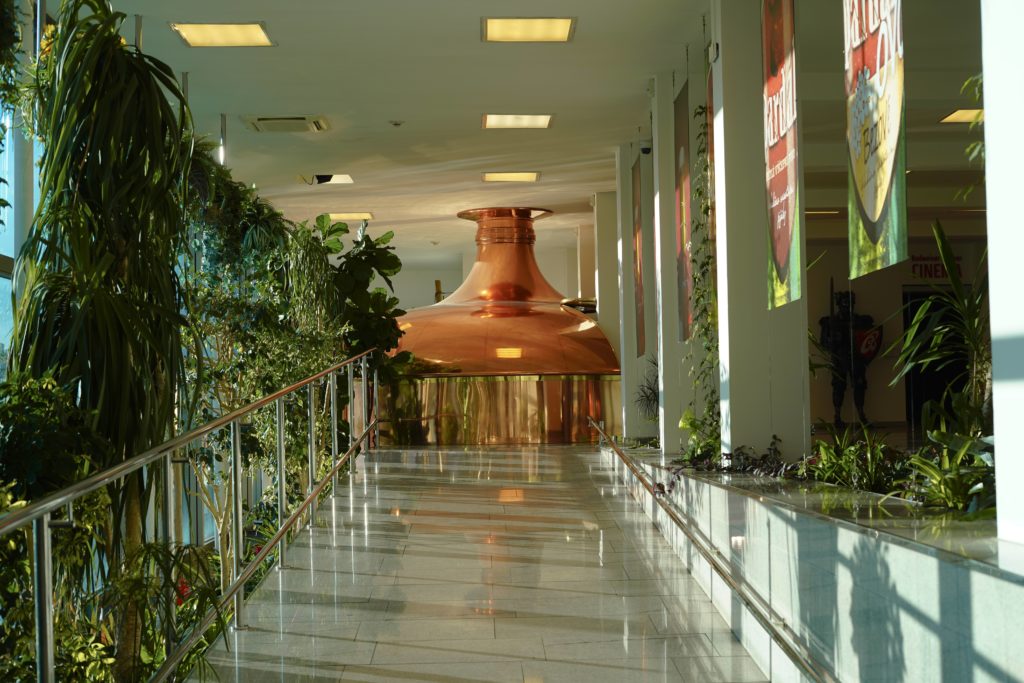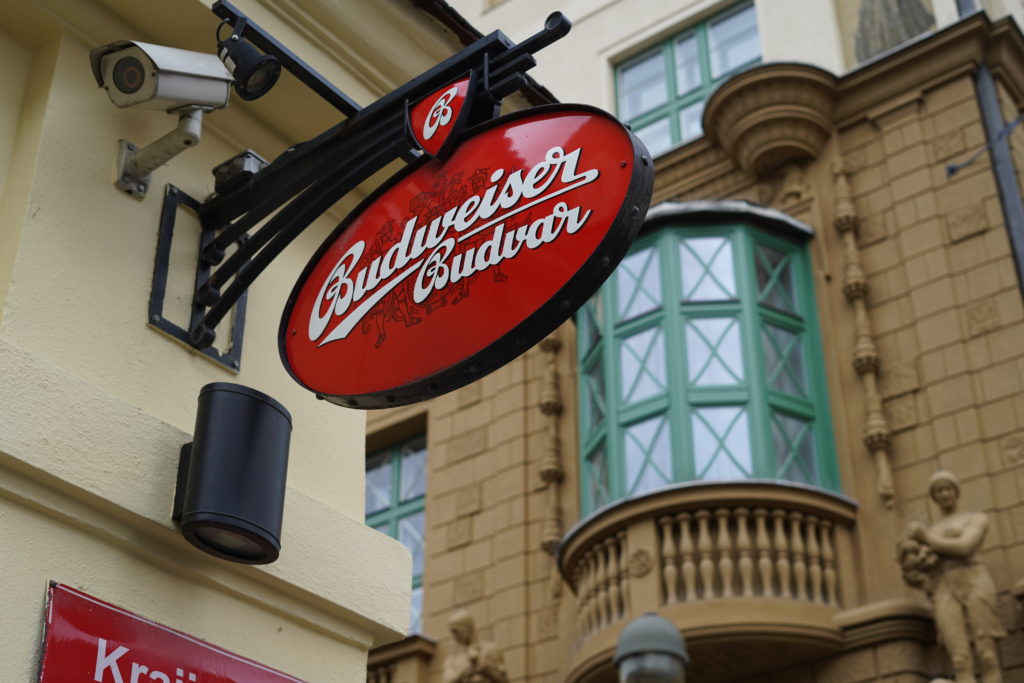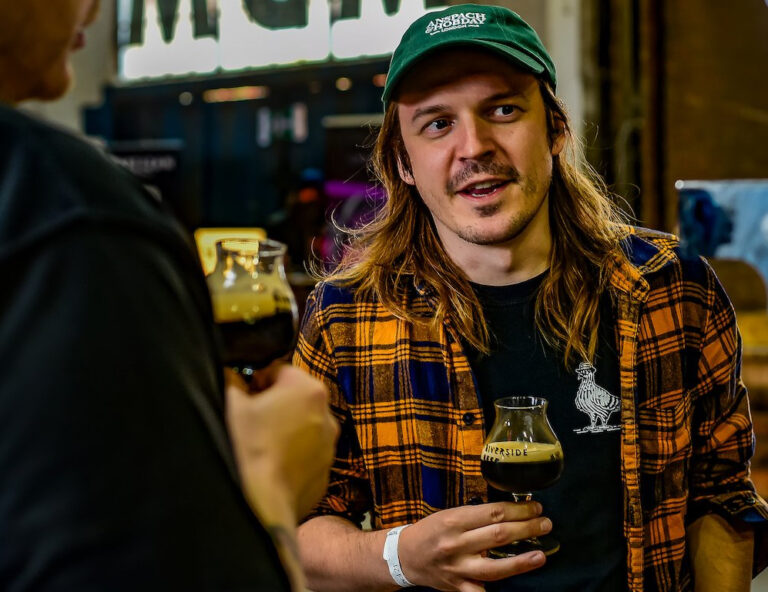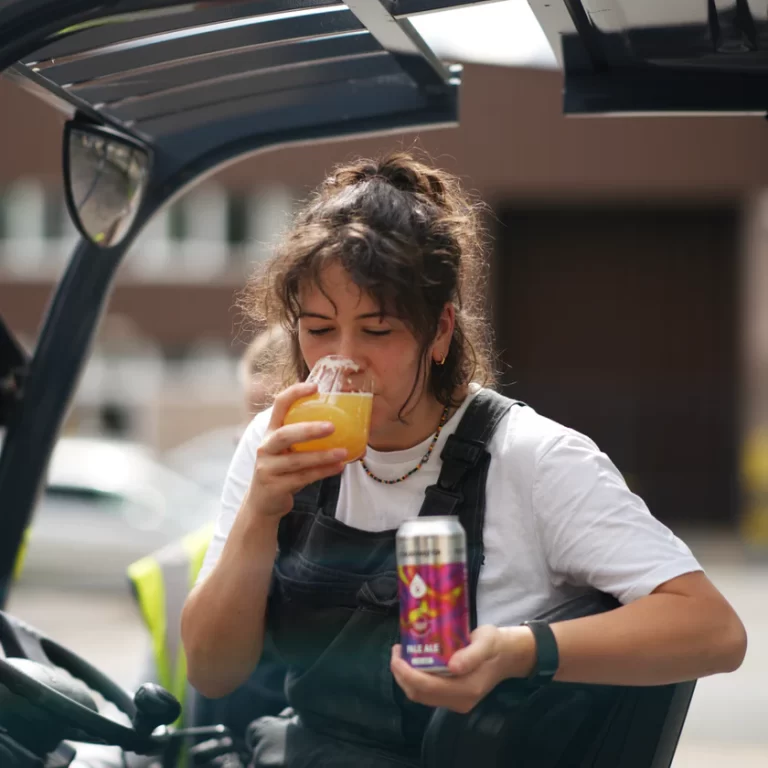In the Czech city of České Budějovice Budweiser Budvar, or Budějovický Budvar as it’s known in Czechia, is undergoing a period of transition. More people want more of its beer, which has led to the investment in a new brewhouse and significantly increased capacity. But certain elements stay constant throughout and that’s the sense of harmony and balance the brewery imbues in the production of its beers. And under the guidance of brewmaster Adam Brož and quality management specialist Petr Košin, Budvar is in very safe hands indeed.
“We have to take a sip each day, it’s impossible not to,” says Adam Brož with a wry smile. Brož is the brewmaster at Budweiser Budvar, and only the 10th individual to hold the position in the brewery’s rich, storied history.
Sat in his office, situated in one of the company’s many cavernous buildings, he’s sampling the brewery’s flagship beer; Budweiser Budvar Original. It’s a daily ritual undertaken around 10am by Brož and his colleague, quality management specialist, Petr Košin.
The beer, a 5.0% ABV lager brewed using whole-cone, Saaz hops from Žatec, had been poured from one of the brewery’s many maturation tanks only moments earlier. The beer had finished cold-conditioning and it was time to taste.

Petr Košin and Adam Brož head up a dedicated and talented brewing team at Budweiser Budvar
The office, which he shares with Košin, looks every bit the home of an esteemed brewmaster. Folders of brewing records dovetail with sepia photographs of days gone by. You could easily transpose any of the brewery’s former brewing heads into the same room and you’d be hard pushed to date the very scene.
“Tasting the beer each day is a necessity. We need it,” he explains. “We get the most complex analysis of the beer that way. Why? Because the human mouth is the most well-equipped tool to judge the beer!”
And when the beer goes through a 102 day brewing process, then who can blame them. The journey of Budweiser Budvar Original, a pale lager with a sweet, deep golden body and an aromatic, hoppy foam begins, of course, with the composite ingredients.
The beer is brewed with 100% Pale malt from the Haná region of Moravia, in the southeast of the Czech Republic. A yearly cycle sees it sown in spring, sometimes up until the middle of March. The barley shoots and grows for 90 or 100 days before its grains are harvested in the high summer sun of mid-July.

On the hop front, whole-cone Saaz hops from Žatec offer up a fine balance of aroma and bitterness, resulting in a characteristic reassuringly associated with beers from the Bohemian region.
The yeast employed by Budvar plays such an integral role in its beers. The first brewmasters at Budweiser Budvar created their own strain of Saccharomyces pastorianus in 1895. This strain helps delivers a finished beer that is crisp and dry, offering up the balance of rich malt with the aroma and bitterness from the Saaz.
And last, by no means least, water’s role in the beer. Water is drawn from an Ice Age aquifer situated in Budvar’s hometown of České Budějovice. Boasting a neutral pH it’s considered to have the perfect hardness for brewing and requires no treatment before it’s transformed into lager.
The young beer is transferred to the brewery’s fermentation vessels for a period of 12 days before moving to the army of horizontal tanks for a full 90 days’ maturation.
“With this composition of ingredients, it’s impossible to drink only one,” laughs Brož, who is in typically pensive mood. “For us, balance is the most important thing above all else. Whether you’re talking about a new beer or an existing one, you need balance.”

He adds: “Sure, you can create a beer. Something that is designed to shock. But that cannot be a beer for regular consumption. For Czech people, beer is like bread. It doesn’t always have to be something you think too much about. Instead, it’s something to enjoy most days without too much thought. And what’s wrong with that?”
Brož has followed in the footsteps of figures such as Antonín Holeček, Rudolf Smolík and Josef Tolar, from whom he succeeded, by holding the prestigious title of brewmaster at Budweiser Budvar.
There’s an understandable sense of pride in holding such a title at Budvar. Brož, like those before him, is the guardian of a brewery that came into being back in 1895, when a so-called group of rebellious Czech brewers took it upon themselves to start their own operation in České Budějovice. A business that has gone on to successfully navigate the challenges of war time, the shadow of the Communist era and also the pressures presented by the open-market.

Budvar’s current brewmaster graduated with honours from the Institute of Chemical Technology in Prague back in 1999. Brož would then join Budvar, working across the brewery’s various departments. He became deputy brewmaster before moving to the top table in 2009, taking over from the regarded and respected Tolar.
Just as Tolar’s 24 year-old stint involved seismic shifts such as the country’s migration from communism to an open market economy, Brož is navigating his own major challenges. And all in his stride, of course.
Ongoing expansion works, overseen by Brož, involve the investment in a new brewhouse and a raft of additional fermentation and maturation capacity.
24 new cylindroconical vessels were installed in late March 2020. These increase its main fermentation capacity to more than 2.2 million hectolitres. Its new brewhouse, with a capacity to produce 600-700 hectolitres per brew, is due for installation in 2021-2022.

New bottling and canning capabilities, and improvements to the brewery’s logistics and warehouse operations are part of the expansion at the state-owned brewery, too.
It’s a major undertaking but Brož is obviously heartened by the increasing global demand for the beer’s he, Košin and the team are entrusted to produce.
“We are a global business but we are very much local, too.” he says. “I often feel like we are the largest craft brewery around. We leverage decoction mashing, we use whole-leaf hops, and adopt three month maturation. For me, being a craft brewery doesn’t depend on the size and scale on which you operate but the attitude and ethos you adopt to brewing and the process that surrounds it.”

On a backdrop of the brewery’s much-anticipated expansion, along with the wealth of skill and expertise required to make it happen, there’s additional excitement in the air. For in a matter of weeks, the eighth iteration of the brewery’s celebrated Fresh Hopped Imperial Lager is due to for release (At the time of writing, the beer is due for release in April).
Brewed using the same recipe and techniques as Budvar’s famous Strong Lager, it’s one of the world’s rarest and finest special edition strong beers. Released annually in late-spring, it is created using fresh ‘green’ hops, picked in the fields around Žatec, brought to the brewery the same day and added to the brew.

Each batch is unique, making its flavour distinctive to that year’s harvest. The beer is aged for a minimum of 200 days in the brewery’s cellars before being released in a limited run of bottles and on draught. It’s rich, deep gold in colour, with a noticeable malt profile and a wonderful honeyed sweetness.
“It is Budvar’s celebration of the hop,” beams Košin. “It’s a welcome addition to our release schedule and done for joy, nothing more.”
The duo had the idea to produce such a beer following a trip to Portland, Oregon and the exposure to the raft of hop-forward beers imbibed during that visit.
Košin recalls: “We were in the USA one August and far from home. We recognised how American brewers have so many hop varieties and are able to celebrate them in a number of different ways.
“So the following month, we harvested the hops back home and brewed with them the very same day. It was a logistical challenge but very much worth it. With the help of those around us, it’s our own celebration of the harvest and of the hop. We’re very happy with it.”

And although Košin and Brož retain the same hop dosage each year, the 2020 release is showcasing a significant increase in bitterness in comparison to previous beers and they’re looking forward to consumer feedback on their latest creation which they jovially refer to as “Jump to darkness” among the brewing team.
While the maturation period for the Fresh Hopped Imperial Lager is at least double that of Budvar Original, one constant throughout its beers is the use of double-decoction mashing. At its core, a decoction mash is a type of mash in which at least one mash rest temperature is reached by removing part of the mash and boiling it in a separate vessel. It is then mixed back in to raise the temperature of the mash.
“For us, decoction is vital to the drinkability of our beers,” says Košin.
Brož adds: “It’s part of the soul of the beer. Beer is a drink composed of more than 3000 components and it’s our duty to work with these. Decoction mashing changes the composition of the drink and it’s a key part of the character of Budvar beers.”

And when it comes to Budvar Original, another integral characteristic is the malt bill which exclusively comprises Czech Pale malt. Brewed with 100% Pale malt from the Haná region of Moravia, it’s the table on which the beer is set. It’s also something that sets it apart from other beers.
“We are very sensitive to caramel additions to Czech lager. In our opinion, it shouldn’t be there! says Brož. “If you want to change colour with Caramel Malt then you’re going to be changing the taste, too. Where does it stop?”
Such an approach to the production of Budvar Original is a point of contention when it comes to how the beer is defined on the international stage.
He adds: “When it comes to international competitions, there are often beers within the Czech and Bohemian categories that feature this addition.
“You also have judges tell us that with don’t fall into those categories and that we’re closer to Munich-style lagers when in fact, our beer has a higher bitterness level than those. So it’s difficult, maybe we’re just in a category of our own.”
And for a company that’s been brewing since 1895, in a city synonymous with beer since 1265, award categories are unlikely to cause them too many sleepless nights.
Instead, they’re only looking forward.
“Expansion will allow us to produce more beer than ever before,” says Brož. “But our approach to brewing will remain the same. Long maturation and a commitment to using only the very best ingredients is at our core. It’s who we are.”









